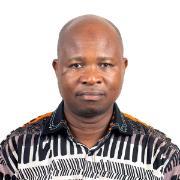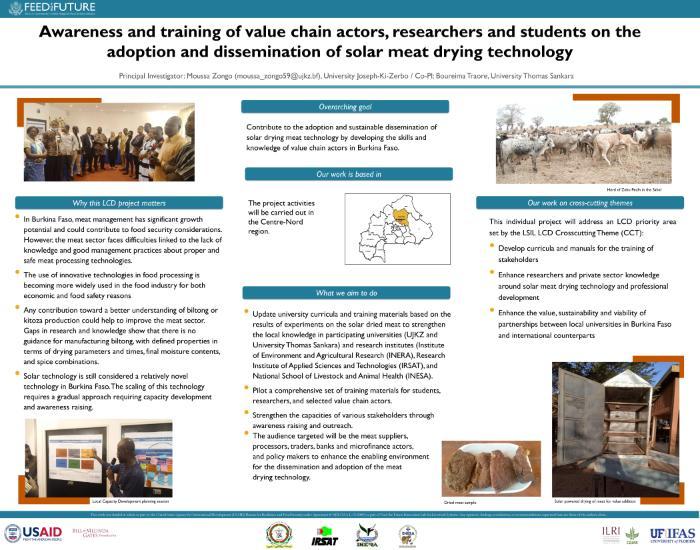Awareness and Training of Value Chain Actors, Researchers and Students on the Adoption and Dissemination of Solar Meat Drying Technology in Burkina Faso
- Research Project Location: Burkina Faso
- Timeframe: April 2024 - June 2025 (Terminated in February 2025)
- Funding: USAID
Introduction
In Burkina Faso, meat management has significant growth potential and could contribute to food security considerations. However, the meat sector faces difficulties linked to the lack of knowledge and good management practices about proper and safe meat processing technologies.
The use of innovative technologies in food processing is becoming more widely used in the food industry for both economic and food safety reasons.
Project Goal and Objectives
The goal was to contribute to the adoption and sustainable dissemination of solar drying meat technology by developing the skills and knowledge of value chain actors in Burkina Faso.
The objectives of the project were to:
- Update university curricula and training materials based on the results of experiments on solar-dried meat to strengthen the local knowledge in participating universities and research institutes.
- Pilot a comprehensive set of training materials for students, researchers, and selected value chain actors.
- Strengthen the capacities of various stakeholders through awareness raising and outreach.
- Target an audience of meat suppliers, processors, traders, banks, microfinance actors, and policymakers to improve the enabling environment for disseminating and adopting meat drying technology.
Background
Solar technology is still considered a relatively novel technology in Burkina Faso. The scaling of this technology requires a gradual approach alongside capacity development and awareness raising. Gaps in research and knowledge show no guidance for manufacturing biltong, specifically regarding drying parameters and times, final moisture contents, and spice combinations. Any contribution toward a better understanding of biltong or kitoza production could help improve the meat sector.
Research Approach
The project would conduct a series of workshops to develop terms of reference for the training manual and the curricula and later the content of the manual and a course. Stakeholders and value chain actors would review and validate the content and mode of delivery.
The materials will then be used to train and encourage producers, suppliers, artisans, processors and traders, and consumers working in the meat management sector to adopt the product and the technology of solar meat drying through a training-of-trainers (TOT) approach. Researchers and students will be trained on the characteristics of dry meat products, packaging and conservation, sensory analysis tests or acceptance tests of the final product.
Through the development of a virtual exchange and communication system, the project will diversify learning strategies and develop scientific, technical and intercultural skills between the University of Florida and the University Joseph Ki-Zerbo. A final workshop will provide a platform to share the results of project activities with stakeholders and raise awareness about meat drying technologies.
Principal Investigator (PI) and Lead Institution

Moussa Zongo, University Joseph Ki-Zerbo (UJKZ)
Additional Collaborators
- Ministry of Animal Resources and Fisheries, Burkina Faso
- Institute of Environment and Agricultural Research (INERA)
- Research Institute of Applied Sciences and Technologies (IRSAT)
- National School of Livestock and Animal Health (ENESA, École Nationale de la Santé Animal)
Resources



.png)


